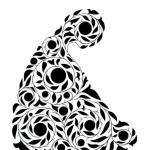What would life be like if you all you had ever eaten was dirt? That’s how a teacher of mine once explained the effect of social and cultural conditioning. “Imagine you’ve been eating mud from the time you were a baby. You wouldn’t want a carrot or an apple,” he said. Knowing the nutritional value of those fruits and vegetables wouldn’t be enough to change your diet, even if you had become ill as a result. In order to stop eating mud, you’d have to develop a taste for real food.
I’ve been thinking about this metaphor lately as I continue my exploration of the Sufi kitchen. I’m realizing that the kitchen isn’t just significant as a symbolic place of being transformed, or “cooked,” in the language of the Sufi tradition. It’s equally important as the place where we draw our sustenance, both physically and metaphysically.
Mevlana tells us:
Man’s original food is the light of God;
material food is not for him;
but from disease,
his mind has fallen into the delusion
that day and night he should eat only this food.
He is pale, weak, and faint:
where is the food of “by heaven
which has starry tracks”?
That is the food of the chosen,
food eaten without fork or throat.
Material food in this sense could be a greasy bag of fast food or a “clean” bowl of organically grown vegetables. The food itself is not the point. Anything that feeds the ego’s desires, whether it is a tasty morsel or a sense of superiority, will veil the heart’s perception and make the soul weak.
Eating mud or material food is a symptom of being enslaved to the nafs, or the “fleshly soul” as it is sometimes rendered in older translations of Rumi’s poetry. The primary delusion of the nafs is that a human being consists of just body and brain, and that therefore life is about responding to the thoughts and feelings they generate.
Living this way turns people into something like meaty robots: “worse than cattle,” as the Qur’an says about those who are most willfully veiled from the truth. Behavior becomes scripted, emotions reactive, and the will attenuated. This is the crippling disease that Mevlana describes in these verses. Living for the life of the body, on the basis of purely material comforts, causes a degeneration of consciousness and a weakening of all the higher capacities of the human being.
By contrast, the food of wisdom that leads to developing the heart, mind and spirit is the kind of knowledge sent down from the higher planes of ‘heaven’s starry tracks’. This ‘food of the chosen’ is not material in nature; thus it is eaten ‘without fork or throat’.
The way that Mevlana talks about food in both senses – the material and non-material – is symbolic, and yet I think it can help reveal the distorted ways we’ve come to look at food in our world today.
The bias of our scientific-materialist culture is not to see food as something whole, complete and satisfying in itself but rather an assemblage of component parts which must be evaluated and weighed against each other in terms of relative benefit: simple versus complex carbohydrates, protein versus fat, and so on. As a result, our diets have become a never-ending series of science experiments: what happens if I cut out gluten? Only eat alkaline foods? Replace coffee with powdered mushrooms? We eagerly pose hypotheses, collect data, and compare results with family, friends and even strangers who are running similar experiments. It makes the old days of counting calories seem quaint, though it’s also instructive to remember that the word “calorie” itself is a term from chemistry: it is the amount of energy required to raise 1 gram of water by one degree Celsius.
Another distortion from consumer culture is to turn food into a set of brand-name ingredients, whether it’s the latest artificial sugar substitute or pasture-raised meat from a local farm. This is especially unfortunate when it turns sustainability into a status symbol, when everyone in society, especially our brothers and sisters in less affluent communities, would benefit from access to fresh, healthy and locally produced food.
But the distortion which would surely puzzle Mevlana the most is food as the consumption of images in our time, especially images that evoke greed, lust and vanity. Our contemporary food culture is pornographic: there’s no other word for it. In that sense, even pictures of food are the equivalent of the material food that Mevlana describes, because they are just another means of feeding the ego while leaving the heart and soul to starve.
But how can a taste for real food be developed, when social media, mass media and advertising are all telling us to eat more mud? I believe that one answer from the Sufi kitchen would have to do with discernment: knowing that there really is more to life than eating and sleeping. Experiencing the peace and the joy of connection with spirit makes the sense-pleasures derived from the body much less appealing. In parallel, taming the nafs through service and inner work creates a space of receptivity where wisdom can be recognized and absorbed.
The soul is sustained by wisdom – the light of God that is mankind’s original food – while the heart lives on love. Through my exploration of the Sufi kitchen, I am continually reminded that that food is meant to nourish relationships, not the solitary consuming self. More profoundly, food is a means of knowing the generosity of the Divine, both as it appears through the beauty and diversity of nature as well as through the inspiration of human creativity. This can be a source of sustenance in itself, and a channel to the abundance that is our true home.












